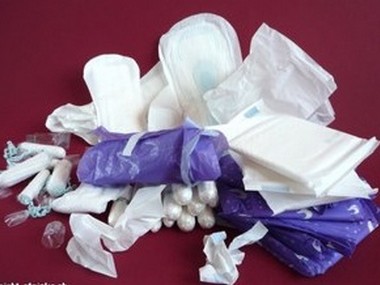The government on Saturday exempted sanitary napkins from the Goods and Services (GST) Tax. Earlier, the women’s hygiene products were taxed under the GST’s 12 percent slab, drawing criticism from activists and other quarters alike. Chaya Kakade, a social activist from Latur, has been fighting to have the government make sanitary pads GST-free. She had launched a protest in Delhi and had called it off only after Union minister Sudhir Mungantiwar had assured her that the government would exempt sanitary napkins from the tax. While announcing the decision on Saturday, interim finance minister Piyush Goyal said had said he was sure “all mothers and sisters will be very happy” to hear the news, but he was wrong.
***
[caption id=“attachment_3799831” align=“alignleft” width=“380”] File image of sanitary pads. Wikimedia Commons[/caption] I don’t understand why we should be happy about the Centre making sanitary napkins GST-free. Did the government do women a favour by granting this exemption? This question still stands — why did the government even feel the need to impose 12 percent GST on sanitary pads? Is the subject of women’s hygiene of any consequence to this government? Why are governments unaware of issues important to women? Why do women have to fight for their rights even in this century? The government is on the back foot when it comes to any concerns related to women. Why? I would have welcomed this decision to make sanitary pads GST-free had the government had made the hygiene products free for women so those in remote villages had access to it. The Centre has worked effectively to curb the spread of HIV-AIDS. It has distributed condoms for free in even at small tea shops in villages and at paan stores. With spreading awareness about HIV-AIDS, men and women are able to get condoms free. Contraceptive pills are also available for free in government hospitals. This alone is proof that if the government sets its mind to something, it can achieve it. What is the big deal about providing sanitary pads for free to women? When compared to HIV-AIDS, the subject of sanitary pads is a relatively small matter that the government can easily address. Why do women have to protest to get the administration to make sanitary napkins GST-free? Is agitating the only way to get the government’s attention? Women in villages suffer because of poor menstrual hygiene as well as a number of condemnable social practices that are still followed in our country. The female population is made to sit outside their house for five days every month while they are menstruating. Many are still unaware of the importance of using sanitary pads, and those who are cannot afford it. Parents of young girls and women themselves believe that sanitary napkins — given the price tag they come with — are a luxury when they have to fight for a meal for their families. Many women suffer health problems as they use cloth pads instead of sanitary napkins. Some women in families also share the same cloth, such is their ignorance of the importance of menstrual hygiene. Anemia and uterus-related troubles are only a few of their problems because of poor menstrual hygiene. Bollywood movie Padman helped shed some light on the subject of menstrual hygiene. But the trouble here was that the film was from a man’s perspective. It would have made a greater impact if a woman had played Akshay Kumar’s character in Padman, given how women who watched the movie understood and related to it more. In the same vein, I believe that if India had had a female prime minister today, there wouldn’t have been any need to protest for women’s health issues — like getting free sanitary napkins or even the absurdity of imposing 12 percent GST on the hygiene products the way the government did. The Bill and Melinda Gates Foundation has been working to help improve women’s health in the United States. While businesses in India take up social work in the name of Corporate Social Responsibility, I would urge them to emphasise the importance of women’s health in their programmes. Firms can adopt districts and help resolve health problems among women to show the government that India Inc is doing what they should have done in the first place. I am not happy with the government’s decision to exempt sanitary napkins from the GST. I am not going to remain quiet about this. I am now going to take this protest countrywide and urge NGOs that work for women to come together at a protest in Delhi to make the government provide sanitary pads for free to women. As told to Sulekha Nair The author is a social activist from Latur who has been manufacturing low-cost sanitary pads for village women with NGO Vichardhara Gramin Vikas Sanstha.


)

)
)
)
)
)
)
)
)



